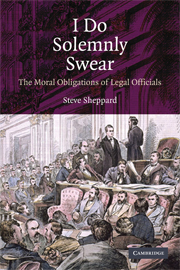Book contents
- Frontmatter
- Contents
- Preface: Moral Officials, Retail Justice, and Three Caveats
- Acknowledgments
- Introduction: Seven Questions about What Is Fit for an Official to Do
- 1 Law and Office
- 2 The Stakes: The Interests of Others in Official Actions
- 3 Officials' Obligations Arise from More Than the Law Alone
- 4 The Moral Obligations of Legal Officials
- 5 Patterns of Relationship between Legal and Moral Obligations
- 6 Breaching Obligations
- 7 Tools for the Trade: Maxims and Fallacies
- Epilogue: What the Official Ought to Do: Law and Justice
- Appendix: Taxonomy of Headings: The Lawes and Libertyes of Massachusetts (Discussed in Chapter 1)
- Index
- References
6 - Breaching Obligations
Published online by Cambridge University Press: 05 June 2012
- Frontmatter
- Contents
- Preface: Moral Officials, Retail Justice, and Three Caveats
- Acknowledgments
- Introduction: Seven Questions about What Is Fit for an Official to Do
- 1 Law and Office
- 2 The Stakes: The Interests of Others in Official Actions
- 3 Officials' Obligations Arise from More Than the Law Alone
- 4 The Moral Obligations of Legal Officials
- 5 Patterns of Relationship between Legal and Moral Obligations
- 6 Breaching Obligations
- 7 Tools for the Trade: Maxims and Fallacies
- Epilogue: What the Official Ought to Do: Law and Justice
- Appendix: Taxonomy of Headings: The Lawes and Libertyes of Massachusetts (Discussed in Chapter 1)
- Index
- References
Summary
“But stay,” someone will object, “when the prize is very great, there is excuse for doing wrong.”…
Work out your own ideas and sift your thoughts so as to see what conception and idea of a good man they contain. Pray, tell me, does it coincide with the character of your good man to lie for his own profit, to slander, to overreach, to deceive?…What is there that your so-called expediency can bring to you that will compensate for what it can take away, if it steals from you the name of a “good man” and causes you to lose your sense of honour and justice? For what difference does it make whether a man is actually transformed into a beast or whether, keeping the outward appearance of a man, he has the savage nature of a beast within?
Cicero, On Duties, Book III, Chapter XXLegal officials will breach their duties. The duties are too many, too conflicting, and too hard. What matters is how the individual official decides what to do and what not to do in an imperfect world in which some measure of failure is certain.
Dirty hands, the longstanding label for the impossibility of an official's satisfying all obligations of office, cannot, however, excuse the official from the duties themselves, nor can it justify failures of morality or illegality.
- Type
- Chapter
- Information
- I Do Solemnly SwearThe Moral Obligations of Legal Officials, pp. 203 - 225Publisher: Cambridge University PressPrint publication year: 2009



